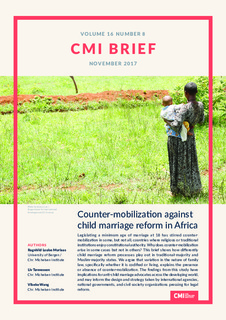| dc.description.abstract | Legislating a minimum age of marriage at 18 has stirred counter-mobilization in some, but not all, countries where religious or traditional institutions enjoy constitutional authority. Why does counter-mobilization arise in some cases but not in others? This brief shows how differently child marriage reform processes play out in traditional-majority and Muslim-majority states. We argue that variation in the nature of family law, specifically whether it is codified or living, explains the presence or absence of counter-mobilization. The findings from this study have implications for anti-child marriage advocates across the developing world, and may inform the design and strategy taken by international agencies, national governments, and civil society organizations pressing for legal reform.
The link between the nature of the law and counter-mobilization
Gender law reforms often meet resistance, and some gender status issues meet more resistance than others. Counter-mobilization from religious and traditional actors is more likely to take place if the gender status issue is doctrinal, that is “contradicts the explicit doctrine, codified tradition, or sacred discourse of the dominant religion or cultural group” (Htun and Weldon 2010: 210; forthcoming, see also Charrad, 2001; Tripp et al. 2009: 113–15) . Family law is a doctrinal gender status issue. Thus, as child marriage legislation is part of family law, counter-mobilization against measures to prohibit child marriage is expected.
Child marriages is prevalent in Zambia (42%) and Sudan (34%). The central governments in both countries have recently led initiatives to legislate a minimum age of marriage at 18 to tackle the practice of child marriage, but counter-mobilization has only occurred in Sudan.
Legal structures and political battles
In most studies, religious and traditional counter-mobilizing actors are conveniently lumped together as forces inhibiting gender law r | |
